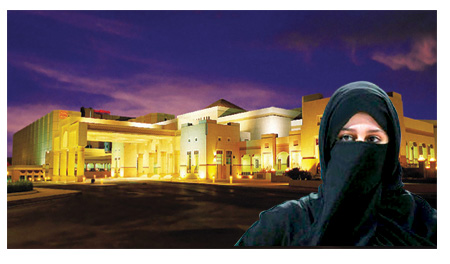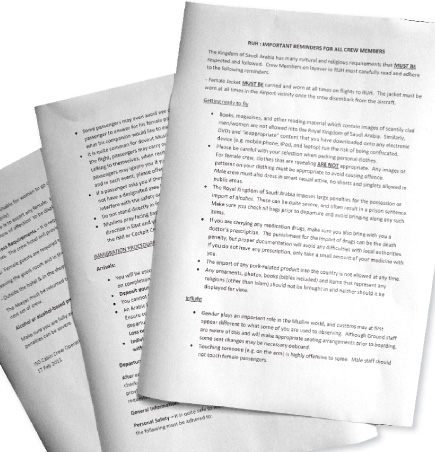Culture shock
Updated: 2011-03-09 07:04
By Simon Parry(HK Edition)
|
|||||||||
|
Riyadh Marriott Hotel, where Cathay Pacific flight attendants say they have been subjected to unsettling experiences during layovers. Provided to China Daily |
Flight attendants from Hong Kong are demanding an end to overnight stops in Saudi Arabia after an unnerving incident involving a young female cabin crew member in her hotel room, Simon Parry reports .
It began with a knock on a door in the middle of the night. Now it has developed into a crisis of confident for flight attendants with Cathay Pacific that may have implications forlong-term scheduling in the Middle East by Hong Kong's main airline.
A young female cabin crew member was in her room at the Marriott Hotel in Riyadh, Saudi Arabia, during a "layover" on a Hong Kong-Riyadh-Bahrain-Hong Kong flight on Feb 28, when she answered a knock on her to find a local man standing there.
"The man said nothing but tried to push his way in," said Becky Kwan Siu-wa, vice-chairwoman of the Cathay Pacific Flight Attendants Union (FAU). "The girl was screaming at him as he tried to push his way into her room.
"Even after she pushed him out, he wouldn't go away. She threatened to call the police and then he went away. She was in tears afterwards and contacted her captain and her ISM (Inflight Service Manager) for help. The captain demanded the hotel view the CCTV footage to see what they could find out about the guest."
According to Kwan, hotel staff advised the flight attendant not to report the matter to police - a claim categorically denied by the hotel - but investigated the incident and has since tightened security on the floor where Cathay Pacific staff now stay on regular layovers.
Badly shaken by her ordeal, the flight attendant has been on sick leave and has received counselling over what happened, according to Kwan, who says the flight attendant is not the only female employee to have unsettling experiences at the Riyadh hotel.
Other cabin crew members have received silent calls in their rooms late at night, or calls from men speaking in heavily accented English, according to the union which on Tuesday asked Cathay Pacific to halt the layovers in the Saudi Arabian capital.
Cathay Pacific says it takes the incidents "very seriously" but insists security has been stepped up by the hotel with CCTV cameras installed and phone screening introduced. It plans to continue with the Riyadh layovers.
The incident took place shortly after Hong Kong's top airline altered its arrangements to give its crews layovers in Riyadh rather than Bahrain because of the political tensions in Bahrain. However, Cathay Pacific already had plans to make the Riyadh layovers permanent from June 2011 onwards.
The FAU is now strongly opposed to the arrangement and says the incident on Feb 28 has spread fear among the cabin crew community. At a meeting with management on Tuesday, it asked the airline to rework its Middle East schedules to let crews do layovers in Dubai instead.
The change in climate from the more relaxed atmosphere of Bahrain to the stricter and more sensitive setting of Saudi Arabia has clearly proved a culture shock for young flight attendants from cosmopolitan Hong Kong.
Kwan said her female members were being targeted by men she described as "lobby lizards" who would seek out the venues where foreign flight attendants stayed overnight and sometimes book rooms in the same hotel to get close to them.
Cathay Pacific issued detailed guidelines to cabin crew before the layovers began in February on how to behave and what to wear when in Saudi Arabia and had even bought 40 sets of concealing "Abaya" robes for flight attendants to wear around the hotel and in the city.
However, the guidelines - combined with the incident on Feb 28 - have left many of the flight attendants who stop over in Riyadh in a state of heightened anxiety that is unacceptable, according to the FAU.
"Flight attendants are too scared to go out now when they are in Riyadh," said Kwan. "As soon as they check in, they seal themselves in their rooms. But we're worried it isn't even safe in their hotel. At least when you go out you are in the public eye."
A management memo was sent out to Cathay Pacific cabin crew on March 4, informing them of the Marriott Hotel incidents and saying: "A few crew members staying at the Marriott Hotel experienced some disturbanceswhilst in their hotel rooms. This included disturbances attheir doors and phone calls to their rooms."
The memo from a Cabin Crew Operations executive said: "As soon as the incident occurred, we were in immediate contact with the hotel to demand that immediate action be taken to ensure that such incidences do not happen again. We also made direct contact with the crewto ensure that they were provided with care and support."
Security had been stepped up at the hotel since with additional security staff deployed in the wing of the hotel where Cathay Pacific crew were staying and any non-airline crew stopped and questioned.
CCTV cameras had also been set up on each floor of the hotel for security monitoring and hotel operators would not transfer any incoming calls to crew rooms without the caller first being able to identify the crew member's name. Direct room-to-room calls must now go through the switchboard.
The memo said: "Situations such as this can occur anywherebut rest assured that we are taking this very seriously and are monitoring the situation closely to ensure that all crew laying over (in Riyadh) are safe and well taken care of.
"The current stay (in Riyadh) is in place as part of the contingency plans around Bahrain.We take the security and well being ofour crew very seriously and the Bahrain contingency plans are under constant review."
Significantly, as far as the FAU is concerned, however, the memo confirmed that layovers would begin on a permanent basis in Riyadh from June.
Kwan and her union colleagues, who say they have for a long time opposed the idea of crew stops in Saudi Arabia because of the cultural issues, want that decision reversed. "As long as (some) local men know that flight attendants are in the hotel, they will hang around," Kwan said.
"It is very easy for them to check into a room or rent a room there on a long-term basis. There's nothing the hotel can do to stop people checking in."
Kwan said despite all the information given to flight attendants by the airline on conduct and dress, the issue of what should happen in the event of an incident like the one on Feb 28 was not addressed.
She said she did not believe the safety of flight attendants can be guaranteed by the airline in any Riyadh hotel because of the cultural differences but said she was concerned Cathay Pacific will take no further action on the matter and "brush it under the carpet".
"We have written to management about this and they have not replied. After we wrote to management, we sent out an email to all members to warn them to be careful - but how careful can you be? We think they should stop the layovers in Riyadh altogether.
"We intend to write to the Legislative Council and the Security Bureau about this if management do not act on this. If Cathay Pacific cannot guarantee the safety of our staff, the government should step in."
Dennis Dolan, general secretary of the pilots' union the Hong Kong Aircrew Officers Association (AOA), said he had only heard of the Riyadh incident anecdotally and cannot comment directly on it.
However, he said: "In a general sense, certainly the AOA is concerned about crew safety at layover hotels. It is our position that as part of the hotel selection process, Cathay needs to assess the level of security at each hotel reviewed and ensure that it meets a very high standard."
June Farrell, a spokeswoman for Marriott Hotels, said the account of events outlined by the Flight Attendants Union was "basically correct" but stressed: "We do dispute the allegation that the individual in question was advised by a member of our team against reporting the incident to the police. In fact we are not aware of any request to contact the police."
Referring to the complaints of silent or mystery phone calls late at night, Farrell said: "It is our understanding of the incident that the individual involved and one other flight attendant reported that their phone was repeatedly ringing on the night of the incident but that neither one answered it. We are not in a position to know who was calling and for what reason."
She added: "Outside of the reported incident on the night in question, we have not had reports of any other similar incident before or after."
A spokeswoman for Cathay Pacific said the airline's Country Manager for Bahrain and Saudi Arabia Daniel Cheung had met the general manager of the Marriott Hotel in Riyadh at the weekend and confirmed additional security measures were in place.
The extra measures included the deployment of extra security staff on the wing of the hotel where airlines employees were staying, the installation of CCTV cameras inside all lifts on the lobby floor and the screening of all phone calls.
"We are taking this very seriously and are monitoring the situation closely to ensure that all crew laying over in Riyadh are safe and well taken care of. We will continue to monitor the situation and conduct a scheduled hotel review later this month, prior to the planned layovers starting in June," the Cathay Pacific spokeswoman said.
Salah Alewa, a spokesman for the Royal Consulate General of Saudi Arabia in Hong Kong, said: "We are aware of this incident and we are looking into it." However, he said, the consulate did not have enough information yet about what took place in Riyadh to comment further.
However he stressed: "Saudi Arabia is a safe and hospitable place for foreigners, millions of people visit Saudi Arabia every year, and the kingdom is keen to make everyone's visit to Saudi Arabia safe and comfortable.
"At least seven million foreigners live and work in Saudi Arabia. The Saudi government has made a lot of effort to ensure the safety and the comfort of all foreigners."
|
Three-page guidelines given to Cathay Pacific flight attendants before layovers in Saudi Arabia began in February 2011. Provided to China Daily |
(HK Edition 03/09/2011 page4)

